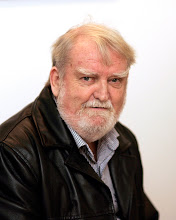I seldom decide in advance blog subjects. I frequently question why I blog at all. Do others have the same thoughts I wonder. And just occasionally something happens, never of worldwide importance that makes me think. And at my age thinking is important. If my mind's not working, it only adds to the other bits and pieces that are not working so well!
I was in the toilet at my local the other day. I was looking round as you do, (You have to look somewhere, and be careful how you do it otherwise you run the risk of having your head 'kicked in'. Not really but its hardly posh where I live and 'chill out'. Smashing pub but the bar's hardly salubrious plus the language is rather ripe, I reckon they throw a bone in every couple of hours just to keep everyone happy.) But I couldn't help noticing the tattoos of the couple of lads from the bar each side of me at the urinal. So we got talking (AFTER we all left the urinal) and I finished up photographing them both as I'm sure you're more interested in their 'art work' than reading my usual weekly drivel.
Both lads were extremely interesting to talk to.(I can imagine some people would have preconceived ideas as to what type of person they were. And in fairness anyone 'different' to the so called norm on occasion we find uncomfortable, even threatening.)

 They took their tattoos very seriously, both had personal stories to tell concerning their 'artistic choices' and both had many more tattoo sessions in mind. It took me back to my days as a schoolteacher in a large comprehensive school many years ago. (In the 1970's.) It was not uncommon for pupils to 'tattoo' themselves. I seem to remember it being particularly prevalent amongst the girls. The 'tattoo' done with either a pen or, of all things, the point of a geometry protractor. The 'tattoo' was scratched on (usually on an arm) and ink, ordinary school ink was fed into the outline. In a way it was a badge of courage. And it took courage, raw adolescent courage as it involved blood, pain and a lifetime with a less than artistic image with which to remember one's schooldays. It was also not unknown to pierce ones ears with the same protractor, infection and sore ears more or less guaranteed! Alas, happy days!
They took their tattoos very seriously, both had personal stories to tell concerning their 'artistic choices' and both had many more tattoo sessions in mind. It took me back to my days as a schoolteacher in a large comprehensive school many years ago. (In the 1970's.) It was not uncommon for pupils to 'tattoo' themselves. I seem to remember it being particularly prevalent amongst the girls. The 'tattoo' done with either a pen or, of all things, the point of a geometry protractor. The 'tattoo' was scratched on (usually on an arm) and ink, ordinary school ink was fed into the outline. In a way it was a badge of courage. And it took courage, raw adolescent courage as it involved blood, pain and a lifetime with a less than artistic image with which to remember one's schooldays. It was also not unknown to pierce ones ears with the same protractor, infection and sore ears more or less guaranteed! Alas, happy days!My sophisticated teacher daughter has a tattoo, unknown to all but her extra observant pupils on occasion! I remember my daughter, then all of twenty asking did I mind if she had a tattoo. At least the tattoo of my daughter and those of my new friends are artistic and professional. (I once taught a young man, now in his forties who has an obscene tattoo across his back, done in his youth. He is now ashamed to go in the local swimming baths with his children.) Ah the folly of a misspent youth. I can also remember the occasional parents at parent's evenings trying frantically to avoid the 'love' and 'hate' tattoos on their fingers being on display for teacher's probable disapproval.
Do you have strong opinions concerning tattoos. Have you got a tattoo and if not, any particular tattoo you fancy!


















